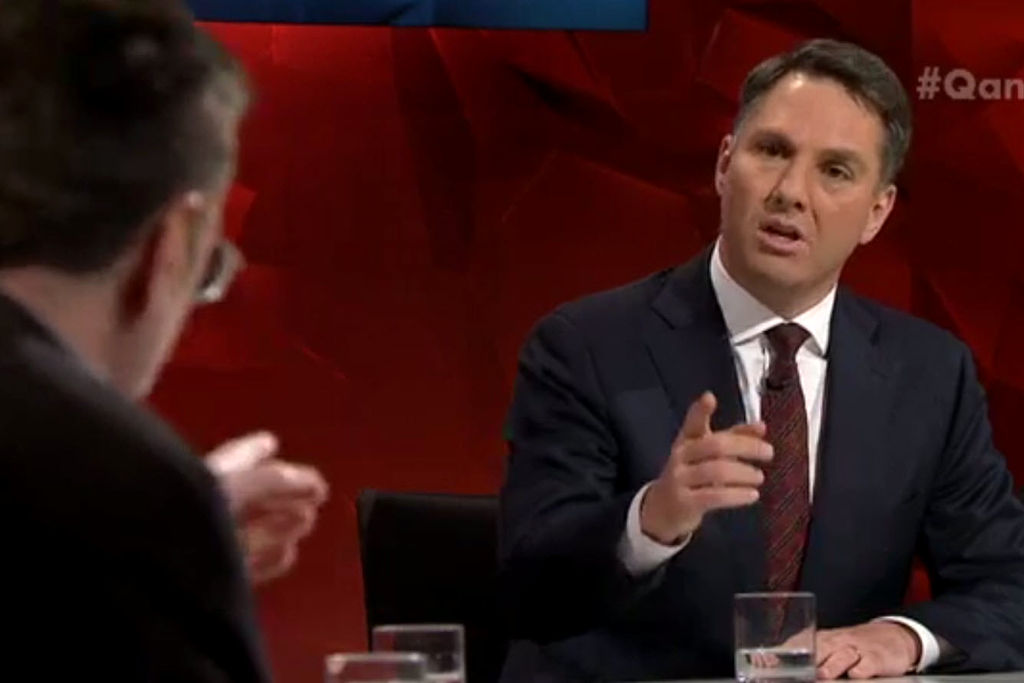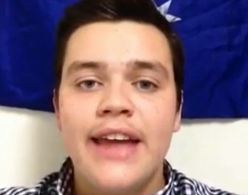We Got A Glimpse Of What A Labor Government Might Look Like On ‘Q&A’ Last Night, And It Wasn’t Pretty
Without someone from the government to make them seem slightly less awful in comparison, Labor bombed. Badly.

Last night’s Q&A threatened to be defined, once again, by the all-consuming beast that is the government’s ongoing Zaky Mallah tantrum, an event that would’ve been immediately followed by the insertion of a pair of high-quality steel chopsticks into my eye sockets. Host Tony Jones tried to nip that prospect in the bud by quickly explaining why Barnaby Joyce was at home polishing his cattle skulls instead of on the panel as advertised, but it didn’t stop everyone talking about it for a while because we are all trapped in the worst director’s cut of Groundhog Day imaginable.

To be clear: we will not be speaking of Zaky Mallah in this recap. He has been discussed enough. Speak not of the man in the marijuana-leaf snapback, on pain of seeing his name in your news feed until the sun implodes.
ANYWAY. Filling in for Joyce was University of Sydney Professor of Modern Greek Vrasidas Karalis, who spent the first fifteen minutes giving his take on the Greek economic crisis while everyone else valiantly nodded along like they knew what he was talking about.
But things got really juicy in the second half of the hour, when attention turned towards the recently-passed Border Force Act and our treatment of asylum seekers. In the absence of any government figure, Shadow Immigration Minister Richard Marles became the panel’s pinata — Tony Jones grilled Marles on whether the Labor Party was considering adopting the government’s boat turnback policy, which Marles responded to with five straight minutes of “look, probably but I can’t say that, can I.”
Will asylum seeker policies make or break ALP’s next election campaign? @RichardMarlesMP responds #QandA http://t.co/RRI9j9lxPH
— ABC Q&A (@QandA) July 6, 2015
Bonus points for noticing that the questioner, who seemed suspiciously praiseworthy of the government’s “strong and unified stance” on “illegal boat arrivals,” posed in front of an Australian flag during his video recording.
It was the Border Force Act, and the provisions within it that criminalise detention centre workers who reveal details of horrific conditions on Nauru and Manus Island, that would dominate the show from there. When a young medical student asked the panel how she could uphold her professional obligations to her patients without breaking the law, Karalis proved to be a far more eloquent and insightful panelist than Joyce would’ve been.
Saying that the current asylum policy is “a matter of profound cruelty,” Karalis pointed out that European countries like Greece and Italy are taking in around 4,000 asylum seekers a day without stooping to the kind of behaviour successive Australian governments have. He argued that politicising what should be a human rights issue “creates an imaginary enemy”, and that in demonising that enemy “we become the terrorists of humanity”.
Vrasidas Karalis says both asylum seekers & people protecting them are being demonised #QandA http://t.co/0yxHFVYbjL — ABC Q&A (@QandA) July 6, 2015
It was the kind of bleeding-heart lefty stuff that would’ve fired up any government frontbencher had they been there, but what surprised everyone was the support the question received from Australian editor Greg Sheridan, who usually describes the government in such glowing terms there’s a timeline of his epic bromance with Tony Abbott out there.
Sheridan highlighted the legislative overreach of the law, and found himself in agreement with Queensland Greens Senator Larissa Waters — a sin for which he will be ritually purified by his fellow Australian journos through a vigorous whipping with freshly-harvested birch twigs.
Greg Sheridan says Border Force Act is an overreach. @larissawaters says we need know about atrocities #QandA http://t.co/kzNmD4ipSb
— ABC Q&A (@QandA) July 6, 2015
And then it came back to Marles. As Shadow Immigration Minister, he’s the guy most responsible for checking whether this legislation didn’t contain any nasty surprises before his party voted for it. Marles maintained, wrongly, that there was nothing in the Border Force Act preventing whistleblowers from going public about detention centre abuses — a claim (see here for a more detailed explanation) which Sheridan and other panelists repeatedly called him out on.
Marles kept at it though, raising the distinct possibility that the Shadow Immigration Minister didn’t understand a vital part of this law when he voted for it.
Why did Labor support the Border Force Act? @RichardMarlesMP responds. Sheridan disagrees #QandA http://t.co/ID621YCKEv — ABC Q&A (@QandA) July 6, 2015
For anyone who wasn’t up on the complexities of a fairly obscure piece of legislation that’s already been passed, it was a little difficult to keep track of the back-and-forth in all this, which made the next contributions from Waters and Sheridan all the more valuable: they clearly and succinctly outlined both the legal barriers to whistleblowing the Border Force Act has enshrined, and the likely real-world implications for doctors and other people working in detention centres. As Waters said, the prospect of being dragged through court by the government is likely to have “a chilling effect” on people speaking out about abuses in detention centres, regardless of how the case would eventually turn out.
All of which went so far over Marles’ head people hitched rides to Bali on the slipstream. “It shouldn’t be me coming out here and defending this,” said the guy who literally gave his party the okay to vote for the bill and thus pass it through Parliament. He then admitted, after much prodding from Jones, that he thinks the government got the law right and that the doctors protesting the prospect of their own arbitrary imprisonment “have got it wrong,” at which point my vision went all red and blurry and I passed out from a rage-induced nosebleed.
The uncertainty in the intersection of laws is chilling, says @larissawaters. Sheridan agrees #QandA http://t.co/vTHkxpnEEe
— ABC Q&A (@QandA) July 6, 2015
The Border Force Act aside, it was fascinating to watch a senior Labor politician try and acquit themselves on Q&A without someone from the government there to make them seem slightly less awful in comparison. Denied the standard “but look how bad they are!” line, someone in charge of an immensely important portfolio in a hypothetical future Labor government was unable to outline a halfway decent policy position, or even display an elemental understanding of the issues they’re in charge of keeping up with.
The worst aspect of Marles’ appearance, though, was the timidity — the Herculean effort not to say anything that could remotely be construed as differing from the government when it comes to immigration policy. If anyone watching last night was worried that a Labor government would fold like laundry at the first shrieky tabloid headline or Liberal scare campaign about The Boats, they had their worst fears realised in real time.
It’s a failure we’ve seen from the Labor Party on all kinds of issues — data retention, the internet filter — but one that, until now, has come under relatively little scrutiny. If that government boycott of Q&A holds good for another few weeks, other Labor pollies might come up just as short as Marles did.
